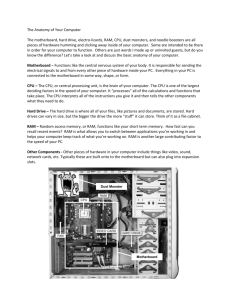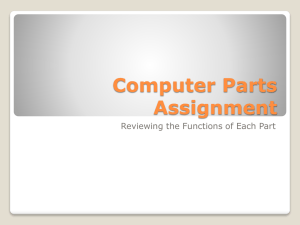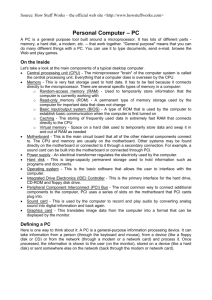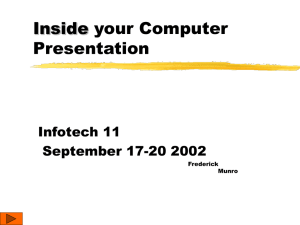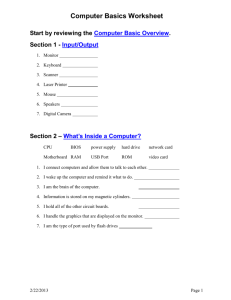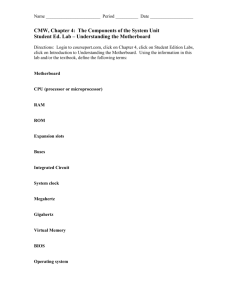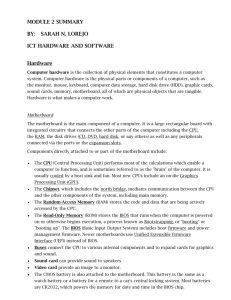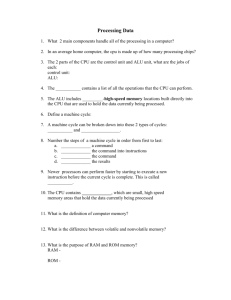central processing unit
advertisement
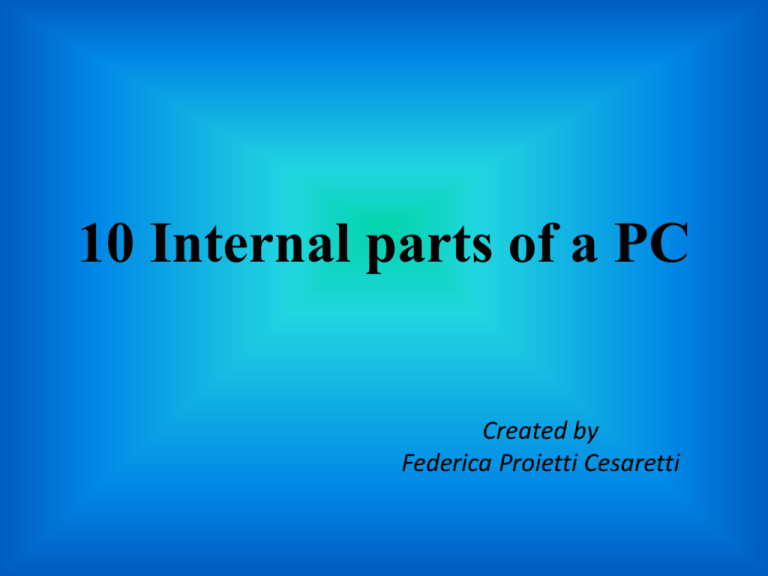
10 Internal parts of a PC Created by Federica Proietti Cesaretti INTERNAL PARTS OF A PERSONAL COMPUTER 1. 2. 3. 4. 5. 6. 7. 8. 9. 10. 11. 12. 13. 14. 15. 16. Scanner CPU (microprocessor) Primary storage (RAM) Expansion cards (graphics cards etc) Power supply Optical disc drive Secondary storage (Hard drive) Motherboard Speakers Monitor System software Application software Keyboard Mouse External hard disk Printer CPU: central processing unit • CPU stands for central processing unit. The CPU is the brains of the computer where most calculations take place. CPU CPU • The CPU is composed of five basic components: RAM, registers, buses, the ALU, and the Control Unit. RAM • Ram stands for random access memory, a computer memory. RAM is considered "random access“ memory because you can directly access any memory cell. RAM memory stays there as long as you don’t turn off the computer. You always need to save your files before turn off the computer otherwise you lose it RAM • If you add more RAM usually your computer works faster. REGISTERS • A register is a small storage which is part of a CPU. • All mathematical information must be represented in a register before it can be processed. For example, if two numbers are to be multiplied or added, both numbers must be into registers, and the result is also registered there. BUSSES • Busses are a collection of wires through which information is transmitted from one part of to another part of the computer busses ALU • ALU stands for Arithmetic Logic Unit; ALU is another component in the CPU. The ALU performs mathematical and logical operations in the computer. The new information is sent to the computer memory. CONTROL UNIT • The control unit coordinates the input and output devices of a personal computer. It directs the operations by providing time and control signals. PCB printed circuit board • PCB stands for “printed circuit board” where you can find chips and other electronic components. Computers has one or more boards, for example: Motherboard, daughterboard, expansion board, network interface card (NIC) MOTHERBOARD • In modern computers, the motherboard is the central Printed circuit board (PCB) and holds many important components of the system. The motherboard is also known as the main board or system board. MOTHERBOARD • Motherboard connects the CPU, the main memory and other important components, such as video and sound controllers Laptop motherboard HARD DRIVE • The hard drive`s responsibility is to store data. Documents, pictures, music, videos, programs, and even the operating system are permanently saved on the computer’s hard drive. HARD DRIVE • A hard drive uses similar memory storage technology to cassette tapes and video tapes. • A single hard disk usually is made of several disks. Each disk needs two read/write heads. One head needs to read the saved data and one head need to write the new information to save in the hard drive. All the read/write heads are attached to a single little arm so that they spin all at the same time. HARD DRIVE GRAPHIC CARD • The graphics card is located on the motherboard; it is able to gather the information from the CPU and then translate it to an image. GRAPHIC CARD
